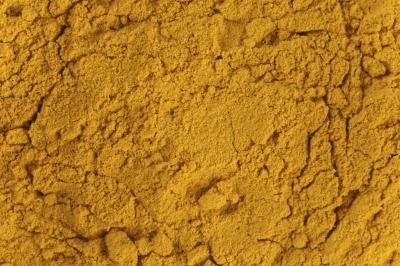
Overview
Turmeric, or Curcuma longa, belongs to the ginger family and naturally occurs in Southern Asia and India. Turmeric supplements come from the plant's rhizomes, which feature rough, brown skin and a dark orange flesh. Known for its fragrant aroma and slightly bitter taste, turmeric is a common culinary spice in Indian cuisine. Turmeric also comes in liquid extract, capsule and powder forms. The traditional Oriental medicine systems have long used turmeric powder to treat a variety of medical conditions.
Digestive Aid
The University of Maryland Medical Center reports that turmeric contains curcumin, an agent that might stimulate the gallbladder to produce more bile. This may help you improve a variety of digestive problems, such as gas and bloating. According to the Beth Israel Deaconess Medical Center, taking doses of turmeric powder might also relieve symptoms of dyspepsia, particularly nausea, appetite loss, belching and stomach discomfort. The curcumin might also effectively treat various inflammatory bowel diseases, including Crohn's disease and ulcerative colitis. The UMMC warns that curcumin sometimes increases stomach acid levels, which means you should not use turmeric supplements to treat stomach ulcers.
Cholesterol Reduction
According to the University of Maryland Medical Center, early research indicates that turmeric can help lower blood cholesterol levels and keep low-density lipoprotein levels from building up in your arteries, a condition known as atherosclerosis. Keeping your LDL levels low can reduce your risk of stroke or heart attack. Turmeric also keeps platelets from clumping together, which means it might stop blood clots from forming on your artery walls.
Cancer Preventive
The University of Maryland Medical Center reports that the curcumin found in turmeric powder might inhibit or prevent various kinds of cancer, including colon, skin, breast and prostate cancers. Turmeric might prevent cancer because its antioxidant properties keep cells from becoming damaged. The curcumin might also suppress the growth of cancerous cells by simply inhibiting the blood vessels that supply the cancer cells.
Other Possible Benefits
Turmeric lowers blood sugar levels in diabetic animals, according to UMMC. However, turmeric supplements might also increase the effects of anti-diabetic drugs and increase your risk of low blood sugar, a condition called hypoglycemia. Early studies indicate that curcumin helps to block the formation of the plaque thought to cause Alzheimer's disease. The National Center for Complementary and Alternative Medicine relates that applying poultices of turmeric powder directly onto your skin might help to treat eczema and heal minor wounds. Turmeric's antioxidant properties might even help to stop the inflammation that causes arthritis.
www.lvestrong.com





No comments:
Post a Comment